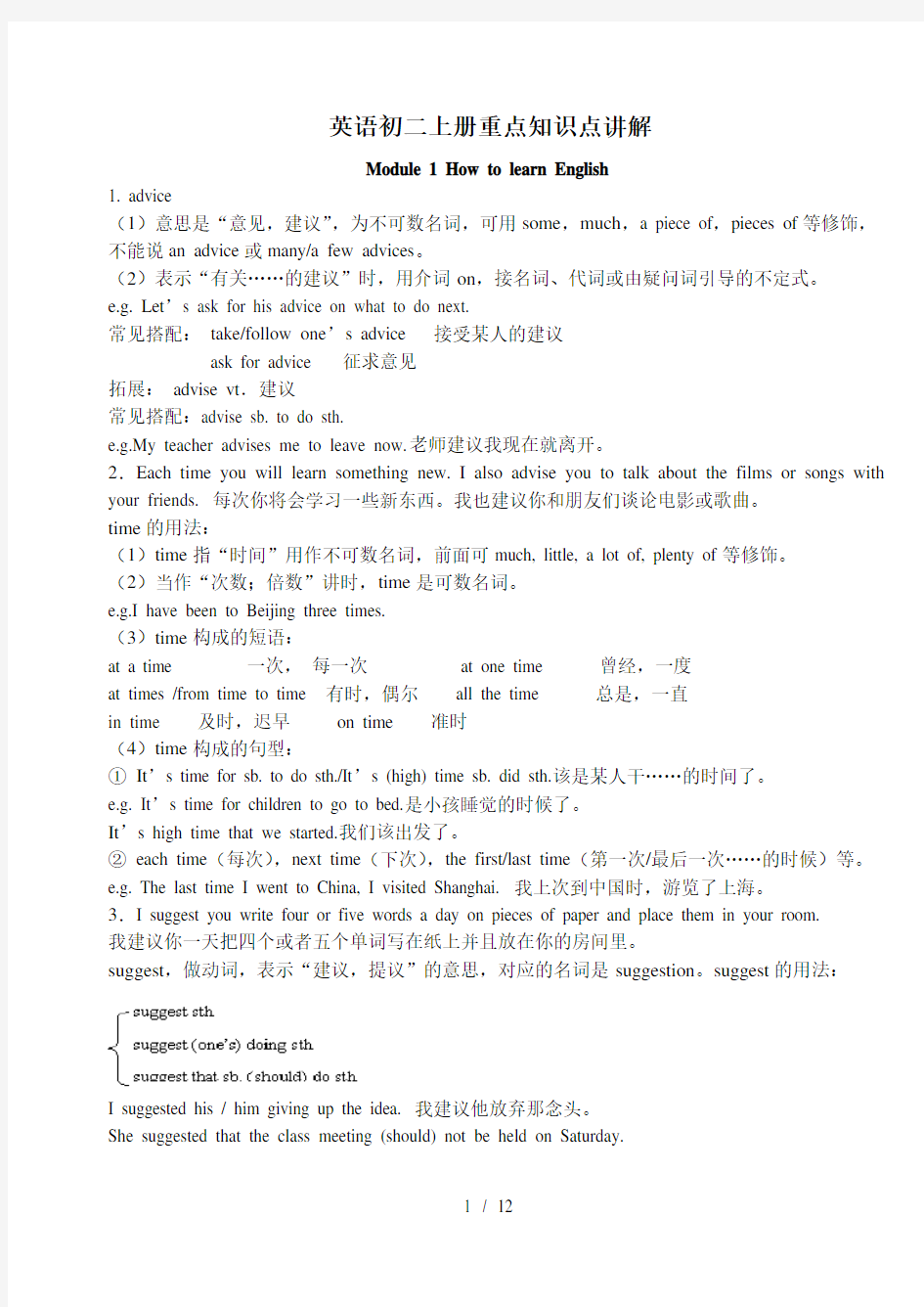八上英语外研版知识点归纳

- 1、下载文档前请自行甄别文档内容的完整性,平台不提供额外的编辑、内容补充、找答案等附加服务。
- 2、"仅部分预览"的文档,不可在线预览部分如存在完整性等问题,可反馈申请退款(可完整预览的文档不适用该条件!)。
- 3、如文档侵犯您的权益,请联系客服反馈,我们会尽快为您处理(人工客服工作时间:9:00-18:30)。
英语初二上册重点知识点讲解
Module 1 How to learn English
1. advice
(1)意思是“意见,建议”,为不可数名词,可用some,much,a piece of,pieces of等修饰,不能说an advice或many/a few advices。
(2)表示“有关……的建议”时,用介词on,接名词、代词或由疑问词引导的不定式。
e.g. Let’s ask for his advice on what to do next.
常见搭配:take/follow one’s advice接受某人的建议
ask for advice 征求意见
拓展:advise vt.建议
常见搭配:advise sb. to do sth.
e.g.My teacher advises me to leave now.老师建议我现在就离开。
2.Each time you will learn something new. I also advise you to talk about the films or songs with your friends. 每次你将会学习一些新东西。我也建议你和朋友们谈论电影或歌曲。
time的用法:
(1)time指“时间”用作不可数名词,前面可much, little, a lot of, plenty of等修饰。
(2)当作“次数;倍数”讲时,time是可数名词。
e.g.I have been to Beijing three times.
(3)time构成的短语:
at a time一次,每一次at one time曾经,一度
at times /from time to time有时,偶尔all the time总是,一直
in time及时,迟早on time准时
(4)time构成的句型:
①It’s time for sb. to do sth./It’s (high) time sb. did sth.该是某人干……的时间了。
e.g. It’s time for children to go to bed.是小孩睡觉的时候了。
It’s high time that we started.我们该出发了。
②each time(每次),next time(下次),the first/last time(第一次/最后一次……的时候)等。
e.g. The last time I went to China, I visited Shanghai. 我上次到中国时,游览了上海。
3.I suggest you write four or five words a day on pieces of paper and place them in your room.
我建议你一天把四个或者五个单词写在纸上并且放在你的房间里。
suggest,做动词,表示“建议,提议”的意思,对应的名词是suggestion。suggest的用法:
I suggested his / him giving up the idea. 我建议他放弃那念头。
She suggested that the class meeting (should) not be held on Saturday.
Module 2 My home town and my country
1.It is on the River Cam and has a population of about 120,000.
它(剑桥)位于康河河畔,人口约为12万。
population n. 意思是“人口,居民”,它是一个集体名词,常用单数形式。
①population常与定冠词the连用,作主语用时,谓语动词常用第三人称单数形式。
e.g. The world’s population is increasing faster and faster.
②当主语是表示“人口的百分之几、几分之几”时,谓语动词用复数形式。
e.g. About seventy percent of the population in China are farmers.
中国大约有百分之七十的人口是农民。
③有时population可用作可数名词,其前可用不定冠词。
e.g. China has a population of about 1.3 billion.中国大约有十三亿人口。
④表示人口的“多”或“少”,不用“much”或“little”,而要用“large”或“small”。
e.g. India has a large population.印度人口众多。
⑤询问某国、某地有多少人口时,不用“How much...?”,而用“How large...?”。在问具体人口时用“What...?”。
e.g.—What is the population of Canada?
—The population of Canada is about 29 million.加拿大的人口大约有二千九百万。
2.It has a population of about seven and a half million, so it is bigger and busier than Cambridge.它大约有750万人口,所以比剑桥更大更繁忙。
(1)million是数词,意思是“百万”。它的用法如下:
①当与具体数字连用时,习惯上用单数,而且也不后接介词of。
e.g. three million people 三百万人
②当不与具体数字连用,而是表示不确定的泛指数时,则不仅要用复数,而且要后接介词of,然后才能接名词。
e.g. A careless mistake cost the company millions of pounds.
一个粗心的错误使公司蒙受数百镑的损失。
拓展:与million有相同用法的数词还有:hundred(百), thousand(千), billion(十亿)。
学习形容词的比较级的规则变化及用法。
(1)规则变化:
